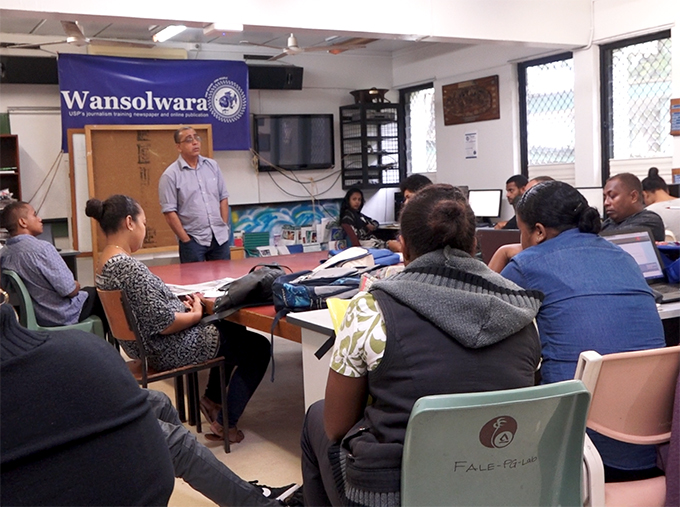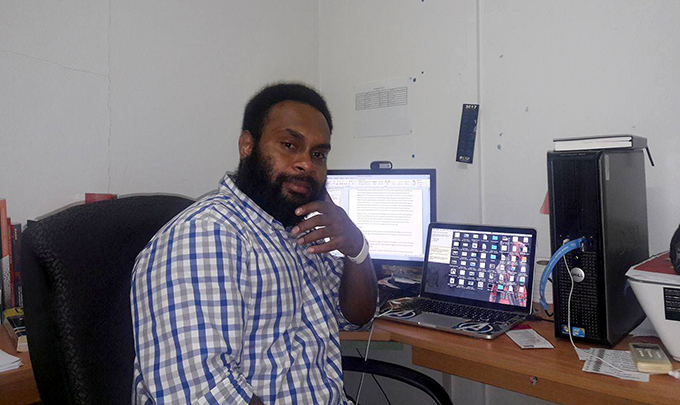
By Kendall Hutt
Climate change is at the heart of a unique regional study into journalism culture in the Pacific.
 The study, focusing on journalism’s role in democracy amid cultural, economic, environmental, political and technological changes throughout the University of the South Pacific’s 12 member states, aims to assess journalists’ understanding and reportage of climate change.
The study, focusing on journalism’s role in democracy amid cultural, economic, environmental, political and technological changes throughout the University of the South Pacific’s 12 member states, aims to assess journalists’ understanding and reportage of climate change.
“The goal is to assess journalists’ capacity for reporting climate change to help formulate approaches to training programmes in this area,” says USP’s senior journalism lecturer and programme leader Dr Shailendra Singh, the study’s project manager and one of its lead authors.
Climate change journalism
Researchers hope to learn how prepared journalists are in reporting climate change, which is one of the most imminent threats facing the Pacific.
Dr Singh says the media’s role in accurately conveying this threat will also be considered by the study.
“Journalists play a very important role in educating the population about the science of climate change, and how it may affect them in their daily lives.”
More importantly, the study is one of only a few to address the issue of climate change in the context of Pacific journalism, Dr Singh adds.
“This study will therefore contribute valuable knowledge about journalists’ understanding of climate change, allowing us to identify potential training requirements.”
The study, a partnership between the University of the South Pacific (USP), Pacific Islands’ News Association (PINA), Auckland University of Technology’s Pacific Media Centre and the Pacific Media Assistance Scheme (PACMAS), also aims to involve young researchers.
“Besides the lead researchers, we have a team of young USP tutors who are doing the field work and gathering data. This is part of their development. It’s part of capacity building for our upcoming academics and researchers.”
‘At our doorstep’
Eliki Drugunalevu, a teaching assistant in journalism at USP, is one of the researchers. He says having the opportunity to be involved in a project which focuses on climate change means a lot.

“Climate change is at our doorstep. And reporting, highlighting it is critical in telling the stories of people who are affected by climate change.
“Not only in that, but helping people, particularly people in influential places, such as policy makers, fully understand that every decision that they make has consequences to those that are on the ground.”
Drugunalevu, who works as both a research assistant and research coordinator for the study, says the regional project is unique in its focus on climate change because it focuses on the issue from a media, rather than scientific, perspective.
“People have this perception that doing research on climate has to do with the sciences – measuring the rise of the sea level, rainfalls and so on – but this project is quite different by looking at it from the media’s perspective and how much attention the media gives to climate change in a vulnerable region like ours.”
Drugunalevu explains he and his fellow researchers are attempting to grasp journalists’ levels of understanding in what he says is “actually dissecting a story that deals with climate change rather than just looking at it as another climate change story”.
He says the current trend on climate change is reporting it “as it is and then moving onto the next story”, which is alarming.
Greater recognition needed
“Climate change means loss of land. It means loss of livelihood. It means potential loss of identity. We’ve heard of stories of people being relocated from a place where they have been settled for generations.
“While it may not mean much to the outside world, to us and to those who experience this, it means the world to them having to move from a place they have called home for generations to a new place. It can quite be an overwhelmingly emotional experience having to witness it and read it as well.”
Drugunalevu and his colleagues would like to see an understanding of how journalists’ report climate change come out of the project, but also hope their findings encourage greater recognition of climate change on the political scale.
“Getting policy makers and people in influential places to recognise the role of the media and see the bigger picture and the impact of the decisions they make on the people on the ground and with regards to climate change is important.”
The study is expected to be completed within the next two years, with research on Cook Islands, Fiji, Kiribati, Marshall Islands, Solomon Islands and Tuvalu carried out by the end of this year.
Research on Samoa and Tonga has already been completed.
Julie Cleaver and Kendall Hutt have been in Fiji for the Bearing Witness project. A collaborative venture between the University of the South Pacific’s journalism programme, the Pacific Centre for the Environment and Sustainable Development (PaCE-SD), the Auckland University of Technology’s Pacific Media Centre and documentary collective Te Ara Motuhenga, Bearing Witness seeks to provide an alternative framing of climate change, focusing on resilience and human rights.











































